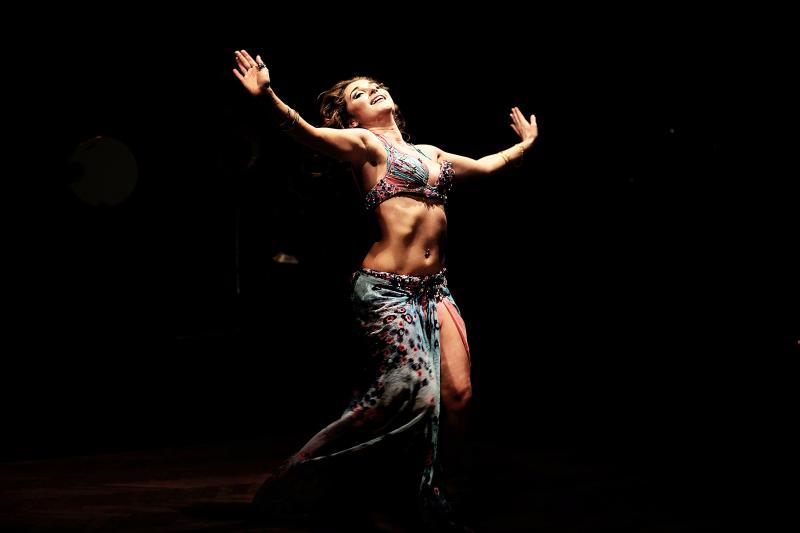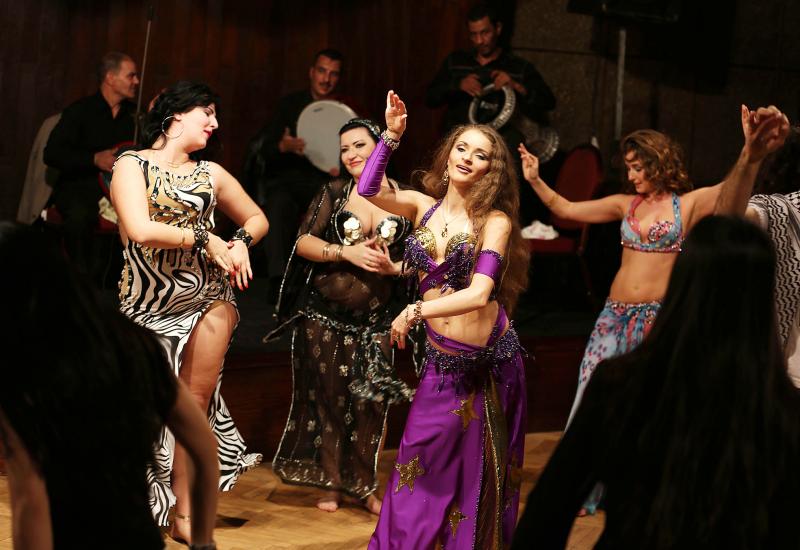As a trickle of tourists slowly returns to Egypt, the floating nightclubs along the Nile are back in business.
And belly dancers are once again in high demand. The glitzy late-night shows attract visitors from all over the world, and especially from the Gulf’s Arab states, with dancers in revealing outfits performing with full traditional musical backing.
But while many dancers are happy to be getting back to work, there is growing disquiet that the artform is becoming closely associated with drinking and nightclub culture. They feel that the belly dance, which is deeply rooted in Egyptian history, has been increasingly seen as more akin to strip dancing, and that this association is making life difficult for the dancers.

Photo : AP
“What we’re seeing more and more of is this dance being hidden in these underground cabarets and bars,” says Egyptian dancer Amie Sultan. “A normal Egyptian family who wants to go to the theater and watch a show will never see this dance.”
As part of a campaign to change perceptions of the traditional artform, Sultan has launched a bid to have Egyptian belly dance included on UNESCO’s Lists of Intangible Cultural Heritage.
Although the dance is hugely popular — it is common to see belly dancers at Muslim and Christian weddings and star performers are celebrities in their own right — Sultan says they are seen more often as sex workers than artists. In Egypt’s conservative society, dancers face intense social stigma, and even risk prosecution for wearing outfits deemed too promiscuous by the authorities.

Photo : AFP
“A mother will hire a dancer for her son’s wedding,” Sultan says, “but she’ll never let her daughter become a dancer.”
CULTURE SHOCK
Born in Singapore, Sultan began her dancing career in ballet. When she moved her focus to belly dance in 2014, she was shocked by a culture where performers compete to wear more revealing costumes and often undergo cosmetic surgery and breast augmentations.

Photo : AFP
“I don’t even like the term ‘belly dance,’” says Sultan, who now teaches what she prefers to call Egyptian dance.
Belly dance, she says “is a term that was invented by the French colonialists in Egypt. They took it back to France and called it danse du ventre (dance of the stomach), but we never call it that in Arabic.”
Her program for young dancers is run along similar lines to ballet training. Students are taught to dance in the style of stars from Egypt’s “golden age” of cinema, such as Samia Gamal and Naima Akef, and to distance themselves from the more sexualised styles found in nightclubs, where Sultan says the traditions have been diluted with other dance styles.

Photo : AFP
Associating belly dance with sex work can make life difficult for dancers. Women trying to break into it as a career risk alienation from their families, insecure accommodation at the mercy of suspicious landlords, and sexual harassment.
Unscrupulous managers have been known to push dancers into sex work.
Dancers can also fall foul of the government’s strict regulations on attire. In 2019, a Russian woman was sentenced to a year in prison for breaching the dress code.
STIGMATIZED
Dance teacher Ali Abdelfattah says belly dancers are stigmatized in a way that doesn’t affect other professional dancers. “The ballet is seen as something graceful,” he says, “but when people see belly dancers, it throws up a lot of question marks. It’s not a good image.”
Abdelfattah says that most of his students attend his workshops without their families’ knowledge.
Because of the difficulties faced by Egyptians, many of those dancing in clubs, cabarets and at weddings come from abroad, especially from Russia and South America. Lurdiana, a Brazilian dancer working in Cairo, says she was recruited to belly dance in Sharm el-Sheikh. “They need dancers here,” she says.
Even within the industry, Egyptian dancers face difficulties. Lurdiana’s former manager once explained his preference for foreign dancers.
“He said that if an Egyptian girl works as a belly dancer, it means she doesn’t come from a good family or have a good education,” she says. “They think that she just does it because she wants to get money and doesn’t have any other options. They can’t imagine that she would do this just because she loves it.”

Anyone who has been to Alishan (阿里山) is familiar with the railroad there: one line comes up from Chiayi City past the sacred tree site, while another line goes up to the sunrise viewing platform at Zhushan (祝山). Of course, as a center of logging operations for over 60 years, Alishan did have more rail lines in the past. Are any of these still around? Are they easily accessible? Are they worth visiting? The answer to all three of these questions is emphatically: Yes! One of these lines ran from Alishan all the way up to the base of Jade Mountain. Its

The only geopolitical certainty is that massive change is coming. Three macro trends are only just starting to accelerate, forming a very disruptive background to an already unsettled future. One is that technological transformations exponentially more consequential and rapid than anything prior are in their infancy, and will play out like several simultaneous industrial revolutions. ROBOT REVOLUTION It is still early days, but impacts are starting to be felt. Just yesterday, this line appeared in an article: “To meet demands at Foxconn, factory planners are building physical AI-powered robotic factories with Omniverse and NVIDIA AI.” In other words, they used AI

Nov. 25 to Dec. 1 The Dutch had a choice: join the indigenous Siraya of Sinkan Village (in today’s Tainan) on a headhunting mission or risk losing them as believers. Missionaries George Candidus and Robert Junius relayed their request to the Dutch governor, emphasizing that if they aided the Sinkan, the news would spread and more local inhabitants would be willing to embrace Christianity. Led by Nicolaes Couckebacker, chief factor of the trading post in Formosa, the party set out in December 1630 south toward the Makatao village of Tampsui (by today’s Gaoping River in Pingtung County), whose warriors had taken the

Last month historian Stephen Wertheim of the Carnegie Endowment for International Peace published an opinion piece in the New York Times with suggestions for an “America First” foreign policy for Democratic presidential candidate Kamala Harris. Of course China and Taiwan received a mention. “Under presidents Trump and Biden,” Wertheim contends, “the world’s top two powers have descended into open rivalry, with tensions over Taiwan coming to the fore.” After complaining that Washington is militarizing the Taiwan issue, he argues that “In truth, Beijing has long proved willing to tolerate the island’s self-rule so long as Taiwan does not declare independence